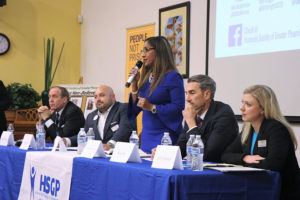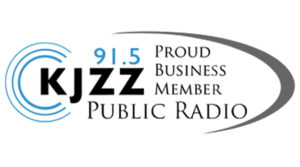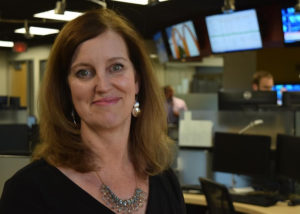Media Profile Rising: Phoenix Humanist Group Sponsors Local NPR Station
 HSGP's Maricopa County Attorney Candidate forum was co-hosted by the ACLU of Arizona and covered on KJZZ
HSGP's Maricopa County Attorney Candidate forum was co-hosted by the ACLU of Arizona and covered on KJZZ In such a noisy world with so many fights for justice, such a fast news cycle, and such powerful enemies opposing humanist values, how do you cut through the chaos to make a showing for your local humanist group? How do you allocate limited resources to gain visibility and attract additional activists who just don’t know you exist yet?
There are a lot of ways to try. Last year, my friends and I at the Humanist Society of Greater Phoenix (HSGP) had an idea. With the generous support of American Humanist Association’s Chapter Grant Fund, we became business members of our local NPR station, KJZZ.
The sponsorship came with a number of perks. We got to use the station’s logo for our online presence and post our logo on their site. They put our logo in e-blasts and gave us shoutouts on the air during membership drives. They hosted networking events for us to interact with NPR personalities and fellow financial supporters of the station (back when you could still go places, which almost seems like another lifetime ago).
Going into this opportunity, I had a number of goals:
- Raise awareness of HSGP in the Phoenix area. Like many humanist groups across the country, we’ve been around for decades, yet still flew largely under the radar. I can’t count the number of people I met during my first year who had never heard of us but immediately expressed interest in humanism when they learned about the organization. It seemed the opportunity to grow was there if we raised our profile.
- Legitimize HSGP in the nonprofit, media, and academic communities. Sometimes as a volunteer-run nonprofit, it’s hard to stand out in a busy world. When all of your local leaders have jobs of their own, not to mention families and personal lives, it can be very difficult to command the peer-to-peer respect of larger, professionally run organizations that compete with us for funding, political clout, and prestige. My goal was to showcase HSGP as a professional player in the local nonprofit community.
- Open fundraising opportunities through the community of NPR supporters in the area. This one is pretty self-explanatory. Among media outlets, NPR attracts highly educated listeners with disposable income who also tend to lean Left politically and hold values and intellectual interests that overlap with humanism.
 The year-long run of the NPR sponsorship ended up being an incredible success, and one that I recommend, albeit with a few caveats.
The year-long run of the NPR sponsorship ended up being an incredible success, and one that I recommend, albeit with a few caveats.
In terms of our first goal to raise awareness of HSGP in the Phoenix area, this is something we accomplished. Alongside the obvious benefits of HSGP branding being sent to the station’s lists, the sponsorship also laid the groundwork for later increases in earned media attention. It takes time to establish relationships with the journalists, editors, and commentators who gatekeep much of the public conversation. My goal was to begin conversations with metro Phoenix radio personalities and their editors so that our activism, community service, and other content could find the largest audience possible.
Contacts made in the networking mixers of KJZZ later became invaluable as we gained opportunities for interviews and live coverage of HSGP events.
Our second goal, to legitimize HSGP in the nonprofit, media, and academic communities, is a bit harder to measure. Anecdotally, reactions were positive whenever HSGP volunteers and I interacted within the larger nonprofit community. People are impressed when a nonprofit they may assume to be small is sponsoring a local institution that is universally respected by most progressives.

Kerry Fehr-Snyder, Science Desk Editor at KJZZ and now recurring HSGP speaker
More measurably, the major opportunities gained through this relationship came in the form of programming. The station’s science desk editor has become a highly popular HSGP speaker, for example, giving regular talks about science literacy.
Of course, we saw it as paramount to meet the fundraising objectives of the sponsorship. While I intended to offer event tickets to HSGP donors as a thank-you for donations, that ended up receiving less interest than I’d hoped. The way to raise money from an NPR sponsorship, it turns out, is simply to lay out the value of supporting public radio to our existing and prospective supporters and ask them to be a part of it. In total, HSGP raised donations traceable to the sponsorship that added up to 2.75 times the cost of the project. That’s more than enough to justify the experiment, and it gives us the momentum for whatever comes next.
With all that said, here is my recommendation: sponsoring your NPR station or an equivalent paid media presence is a good place to start if you’re trying to wade into local media but don’t have a lot of local contacts or history of coverage. Now that the AHA grant money is used up, the Humanist Society of Greater Phoenix has elected not to continue funding the NPR sponsorship on our own.
As we move forward with our new experience and contacts in local media, we continue to transition away from paying for media exposure toward earning it. Sponsoring a radio station is expensive, and anyone trying it should be fully prepared to spend the time required to get the full benefits of the sponsorship. The access you can gain to media outlets is incredible, but you need to know how to generate positive publicity, manage negative coverage, and follow through on deploying press releases and chasing interviews whenever your humanist work is newsworthy.
If your humanist group is interested in doing something similar with NPR or other outlets where you want to make a splash, please feel free to contact me at luke.douglas@hsgp.org to chat.
